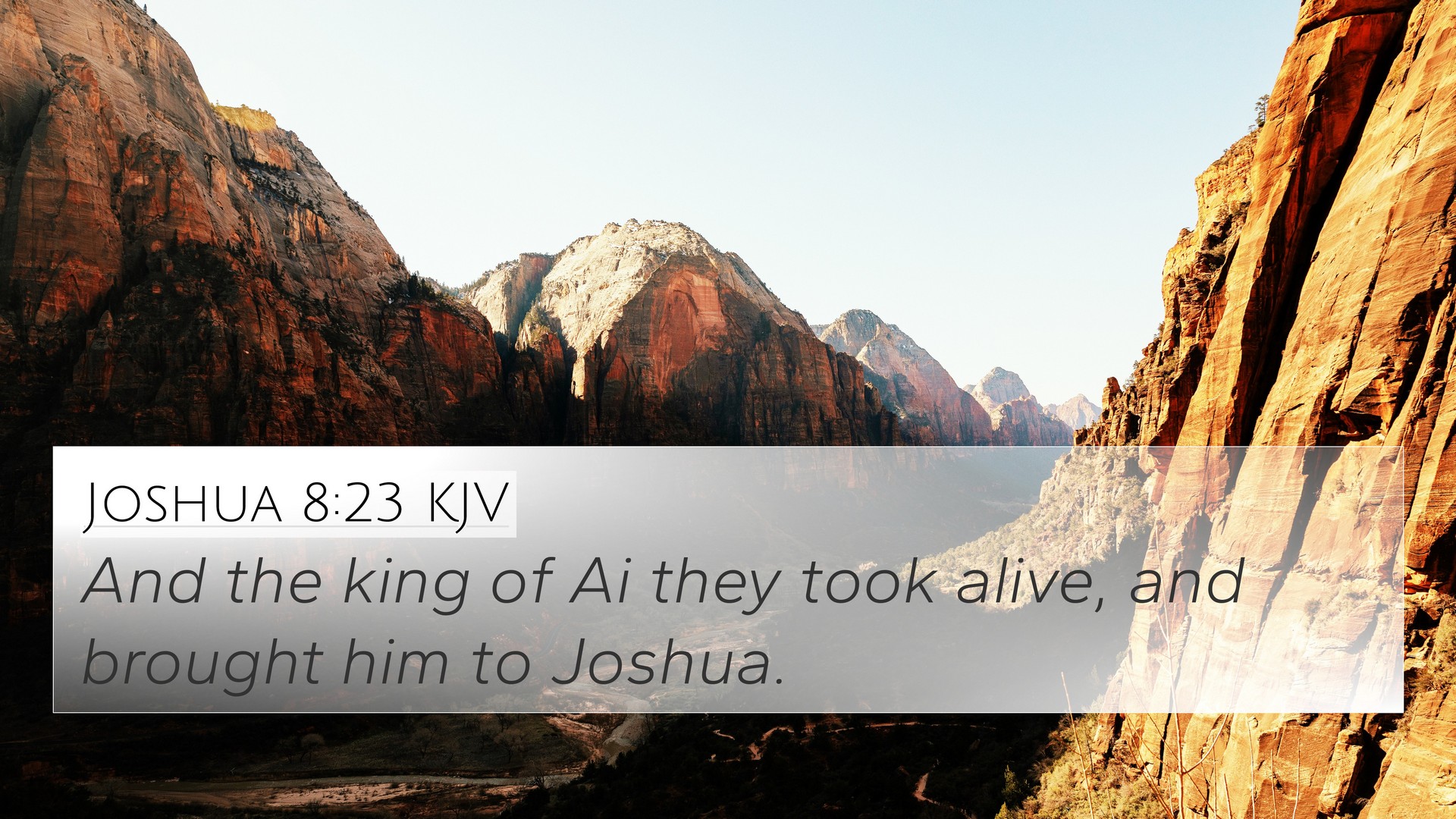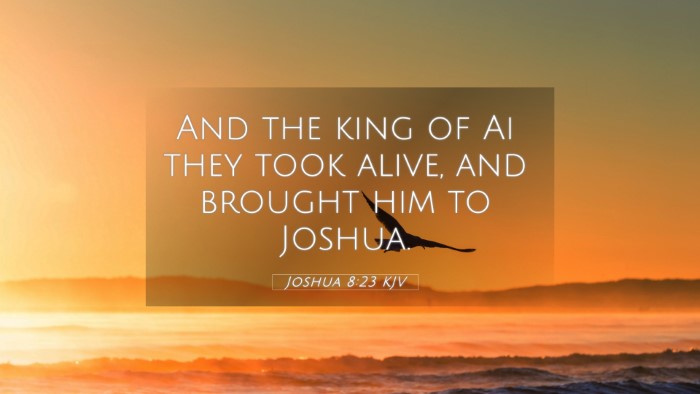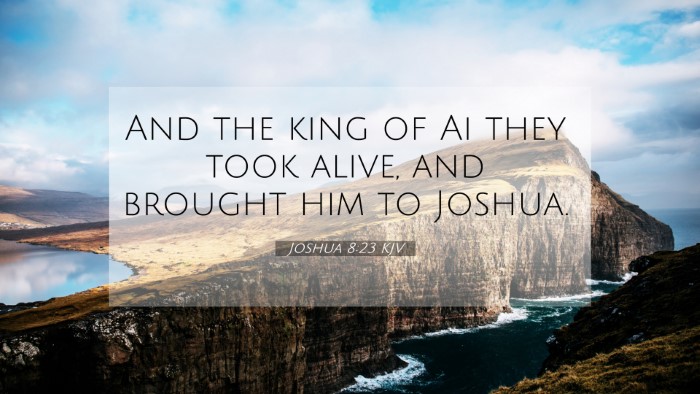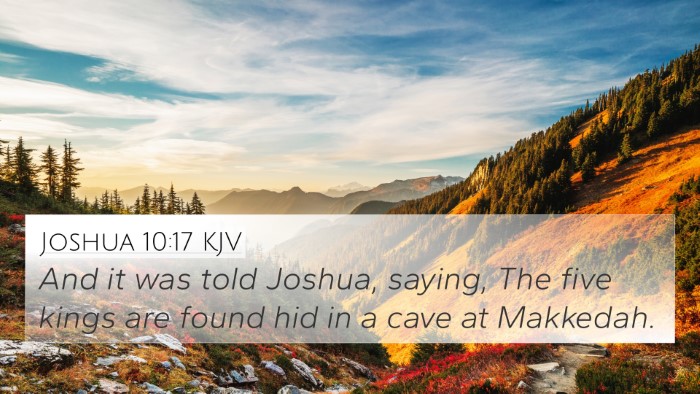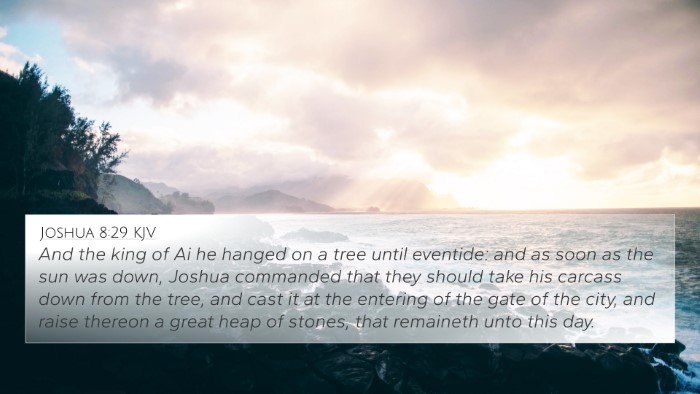Bible Verse Meaning: Joshua 8:23
Verse Reference: Joshua 8:23 - "But the king of Ai they took alive, and brought him to Joshua."
Summary of Meaning
This verse captures a pivotal moment in the conquest of Ai, underscoring themes of divine justice, the fulfillment of God's commands, and the authority of leadership represented by Joshua. The capture of the king signifies not only the defeat of the city but also the complete subjugation of its leadership under Israelite authority.
Commentary Insights
- Matthew Henry: Henry emphasizes the significance of God's fidelity to His promises. The capture of the king illustrates that God executes His judgment upon the enemies of His people. It serves as a demonstration of divine power and the effectiveness of following God's strategic commands. The live capture signifies future accountability and possible punishment for disobedience against God.
- Albert Barnes: Barnes notes that the king's capture indicates the finality of Israel's victory. The act is portrayed as a fulfillment of the commands given to Joshua, affirming the direct involvement of God in the struggles of His people. This sets a precedent for the treatment of enemies and reflects God’s sovereignty in the affairs of nations.
- Adam Clarke: Clarke discusses the moral implications of capturing a king alive, suggesting that it adds a deeper layer of humiliation and serves as a warning to other rival kings. The act denotes that Israel, under God's command, is not merely a military force but an instrument of divine justice. This captures the essence of God's ongoing mission to establish His people in the promised land.
Bible Cross-References
To enhance understanding and provide further context, here are related Bible verses:
- Deuteronomy 20:16-18: Commands for how to deal with cities that are far away versus those that are close, illustrating God’s direction in warfare.
- Joshua 7:5: Discusses the initial defeat at Ai, underscoring the need for purity among God's people prior to victory.
- Joshua 10:5: Illustrates God's support in battles; the king of Jerusalem is similarly defeated.
- 2 Kings 18:33-35: Questions the trustworthiness of the God of Israel amidst military troubles, emphasizing the theme of divine protection.
- 1 Samuel 15:33: God's command about destroying Amalek's king resonates with the theme of divine justice conveyed in Joshua 8:23.
- Isaiah 34:5-8: Prophetic judgment upon nations serves as a broader context to the justice enacted in the exchange with Ai's king.
- Matthew 28:18: “All authority in heaven and on earth has been given to me,” linking the authority represented by Joshua to that of Christ.
Thematic Connections
- Divine Authority: Joshua’s leadership illustrates God's divine authority over His chosen people.
- Justice and Judgment: The capture of the king serves as an embodiment of God's judgment on those who oppose Him.
- Fulfillment of Promise: This event parallels the promises made to Abraham regarding the land, serving as a reminder of God's faithfulness.
Conclusion
Joshua 8:23 encapsulates significant lessons about leadership, obedience, and the faithfulness of God in executing justice upon His people’s enemies. By looking at this verse alongside others, we deepen our understanding of God's overarching narrative through Scripture.
Tools for Bible Cross-Referencing
To explore these connections further, consider using:
- Bible concordances: Useful for finding word-based connections across different verses.
- Bible cross-reference guides: Comprehensive resources can aid in identifying similar themes.
- Bible study tools: Online and print resources that facilitate cross-referencing Bible study methods.
Further Study
For those desiring in-depth exploration, consider themes such as:
- Identifying connections between Old and New Testament.
- Diving into the comparative study of Pauline epistles.
- Understanding the links between the Prophets and Apostolic teachings for a broader context.
